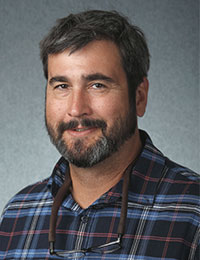
Alaskan Roots of an Award-Winning ReporterBy NICOLE RANDOCK
November 04, 2016
Loomis' unique childhood made him gain much respect for the environment. As a national award-winning environmental reporter at the Arizona Republic, Loomis has had a job most people will never experience: exploring breathtaking places such as the Grand Canyon and Yellowstone National Park and writing about the pressing issues facing these natural wonders. Ultimately, it was luck and his Alaskan roots that inspired Loomis to cover environmental issues. Migrating from Ketchikan to the University of Nebraska-Lincoln in 1986, Loomis took a summer internship at a small newspaper in the ski town of Jackson Hole, Wyoming. He quickly learned that the citizens of Jackson Hole were interested in a wide range of stories related to the environment such as his story about wolves reintroduced into Yellowstone Park. It was a combination of what the readers wanted and what topic he enjoyed covering most that led him to his position at the largest newspaper in Arizona. His skill for environmental reporting was innate, a passion only his father Greg could fully understand. “He was doggedly bold when it came to dreams. And I listened only too well when he counseled living for them and not for money,” Loomis said in an article he wrote for the Arizona Republic after his father died. Loomis became the writer his father had always dreamed of becoming himself. He delved into journalism initially to please his father but as time passed he realized his love for writing went far beyond that. During his time in Alaska, Loomis reported for the former Anchorage Daily News and he was the city editor of the Juneau Empire. Growing up in this area made him appreciate nature. He became attuned to the environment and learned how people interacted with the natural resources. Climate change topics have started to garner more public interest given the issues the world faces today. Such issues, among others, are species extinction, stronger storms, and diminishing natural resources. In 2012 Loomis was awarded the Grantham Prize for Excellence in Reporting on the Environment for a series about the decline of the ancient conifer forests, which encompasses a large stretch of land from New Mexico to the Canadian border. The following year he won the Best of the Loomis received more than 100 emails after his series was published when he usually receives 10. It was apparent, Loomis said, that people were now realizing water conservation issues and climate change might be interrelated. Loomis conducts background research on the subjects he covers yet he cannot spend too much time studying one area of environmental science. He said it’s important to understand the foundation of the issue and have the courage to contact the scientists for their expertise. “We’re not writing for the scientists, we’re writing for regular people,” Loomis said. Although, according to NASA, most scientists have come to accept the scientific consensus that climate change is anthropogenic, Loomis admitted that he still receives push back from readers. Some readers are convinced that climate change is nothing more than a cyclical weather pattern. Others believe climate change is simply a political strategy. Loomis makes sure to represent both sides, including viewpoints of those who do and do not believe humans are forcing changes in the world’s climate. “It is sometimes good to be reminded that not everyone buys that this is a real issue. I can’t spend too much time appeasing them when there are bigger issues,” he said. Despite those views, “…97 percent or more of actively publishing climate scientists agree: Climate-warming trends over the past century are extremely likely due to human activities,” according to NASA’s website, climate.nasa.gov. Becoming an environmental reporter has not only provided Loomis with a fulfilling career, it has also taken him back to his Alaskan roots, something he knows would make his father proud. Loomis said there isn’t anything he’d like to change about his career path. “I feel like I would be ungrateful to my career and to all the editors I’ve had if I said there was something I wanted to change about my career. I’ve gone so many places and learned so much. Instead of changing things I hope my career… is sustainable and I can keep doing this for another 15 years,” he said.
NICOLE RANDOCK ©2016 Nicole Randock is a journalism student at the Walter Cronkite School of Journalism and Mass Communication Barrett, the Honors College
Representations of fact and opinions in comments posted are solely those of the individual posters and do not represent the opinions of Sitnews.
|
|||
